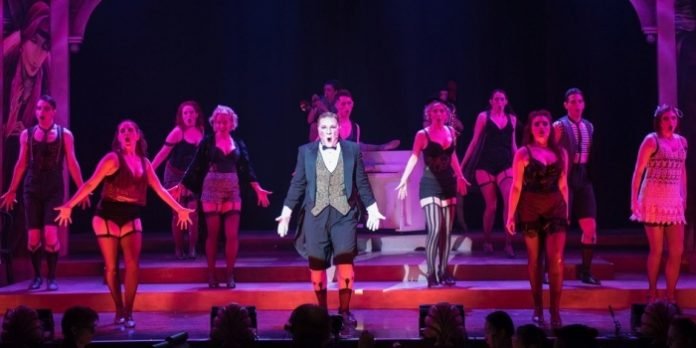The Royal City Musical Theatre production of Cabaret may very well have one of the most haunting endings you will ever see on stage.
Based on the novel Goodbye to Berlin by Christopher Isherwood, Cabaret details the rise of the Nazi movement among the ruins of the Weimar culture in 1930’s Berlin.
Regarded as one of the most fertile grounds for the modern arts and sciences in history, Berlin of the time was also a time of great decadence. Complete with countless erotic entertainment venues, it all began to change as the Nazi regime took over. It is at this intersection where Cabaret takes place.
On its surface, Cabaret is the story of a struggling American writer, Cliff Bradshaw, who arrives in Berlin, to soon find himself inside the outlandish, Kit Kat Klub. Overseen by a gender-bending Emcee, sexuality of every persuasion is both on display and celebrated. Soon taking up with English entertainer, Sally Bowles, the two are torn between the country’s new politics and a desperate desire to hold onto the past.
Despite its very specific time and place, and having been written more than 50-years ago, it is surprising how a piece of musical theatre can still resonate. While many in the American musical theatre cannon have not aged well, Cabaret remains one of those rarer entities. It is not only a history lesson of the horrors of its time, but also a reminder of how little progress we have actually made.
Breaking with musical convention at the time, Cabaret’s structure remains just appealing today. While dialogue and songs are the tradition, in Cabaret the additional layering of cabaret numbers to provide social commentary is very satisfying.
Helping to bridge these two layers is The Emcee, played by Andrew Cownden. Undeniably the star of this production, he is one of four professionals on stage that also includes Lauren Bowler (Sally Bowles), Cheryl Mullen (Fraulein Schneider) and Damon Calderwood (Herr Schultz). Commanding the stage on each appearance, there is a playfulness to Cownden’s performance that is as fulfilling as his voice.
It is a shame though that director Valerie Easton chose to play so much of the drama far upstage in set designer Omanie Elias’ rooming house, as it flattened some of the other performances. As with Easton’s Anything Goes last year, the chasm between actors and audience is almost insurmountable.
Most affected here are Lauren Bowler as Sally Bowles, and Tim Howe as Cliff Bradshaw. While Bowler also seemed uncomfortable at times during the dance numbers, she was unable to overcome the distance. In one of this musical’s more memorable numbers, Bowler goes for broke in a daring, although not entirely successful, rendition of the title song.
As with past Royal City Musical Theatre, many of this show’s riches comes from the talented ensemble. The dancing is tight, and when the company comes together in the larger numbers, the sound is indeed wonderful. The harmonies from the Kit Kat Boys in the act one “Tomorrow Belongs to Me” was absolutely glorious.
Under the direction of James Bryson, the orchestra is indeed “beautiful”, easily handling Kander’s music. It was disappointing then that they did not get their moment to really shine in the entr’acte, as the frustrating audience chatter drowned out most of it.
While perhaps a little more daring than past shows from Royal City Musical Theatre because of its adult content and themes, Cabaret still continues to resonate because of them. It is a shame though that so much of what makes this timeless musical so engaging could not quite overcome the distance from stage to our seats.
As for this production’s final moment? It is an image that will stay with you for days.
Cabaret with book by Joe Masetoff, music by John Kander, and lyrics by Fred Ebb. Based on the play by John Van Druten and stories by Christopher Isherwood. Directed by Valerie Easton. A Royal City Musical Theatre Company production. On stage at the Massey Theatre in New Westminster until April 29. Visit https://royalcitymusicaltheatre.com for tickets and information.
(Editor’s note [15 April]: this review was edited to reflect the production included four professional/equity performers rather than the two originally cited).

